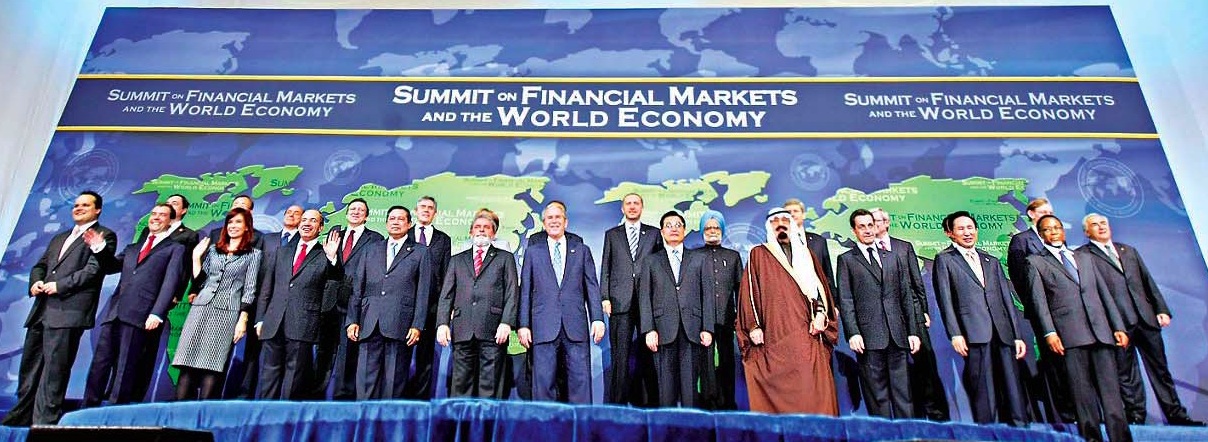|
Soc 450:
Globalization
and Social Change
Spring 2010 Instructor: Dr. Gonzalo Santos     Dr. Santos' Office: DDH-AA205 Phone: 661 654-2191 Office Hours: 11:00 - 12:30 pm MWF. |
|
Soc 450:
Globalization
and Social Change
Spring 2010 Instructor: Dr. Gonzalo Santos     Dr. Santos' Office: DDH-AA205 Phone: 661 654-2191 Office Hours: 11:00 - 12:30 pm MWF. |
Textbooks:
Course Content:
This course explores the theory and dynamics of
global integration in the contemporary social world, how it affects,
and in
turn is
affected by, the world's
economic, political, cultural and social structures, trends, and
processes. First, using the Steger anthology of
articles, we'll analyze some of the key theoretical perspectives on the
origins, many structural dimensions, consequences, and contemporary
trends and challenges of globalization, from some of the
principal scholars in the field. Then, using the McMichael anthology,
which analyze case studies from specific countries, we explore the many
ways humans react collectively, from the bottom up, through social
movements of all sorts, to globalization, and in so doing, change the
pace and direction of globalization itself. All in all, we'll read and
discuss thirty six articles or so, depending on how many students take
the class.
Course Structure:
Attendance: Attendance
is mandatory (no
tardiness or early departures please, as these, as well as unexcused
absences, will be penalized by one point off the final grade).
Furthermore, all
students must come prepared to discuss the assigned readings - either when they
make their
formal presentations,
or if they are not presenting,
by bringing to class their "reading
assessments" (see below).
These reading assessments must be turned in to Dr. Santos at the
beginning
of each class session.
Class Presentations:
The course will be run as a "semi-seminar," whereby on every class
session
an individual student (or two) will introduce the article(s) assigned,
followed by Dr. Santos's lecture and class discussion. Each student
presents once in the quarter. Students will be
assigned their respective class presentation on the first day of
classes. Any article assigned to a dropped student will be covered by
Dr. Santos.
Students shall do their presentations in
Power Point. Time allotted per individual presentation
will
be 10 to 15 minutes. Presenting students will introduce, describe,
highlight, and
summarize
his/her
own assigned reading, and on the last slide raise one or two key
questions
for subsequent discussion. As a precaution, please bring your
presentations in a USB-type
memory stick and also email
it to your own email account. Presenting students should
show up early to set up & test their presentations prior to the
class starting.
The presentations will be graded based on: (a) the analytical strength of the presentation, including its depth & breath (how well it covers all the main aspects), (b) the quality of the question(s) posed at the end, and (c) the quality & style of the oral presentation (including the visuals displayed).
Reading Assessments: To
ensure that everybody come to every class prepared to discuss the
assigned
readings
for the day, students who are not
presenting must bring to class written "reading assessments," one
for each of the
assigned readings for the day, each a page to two pages in length,
double-spaced text. No
late reading assessments will be accepted (nor assessments
submitted by email), unless the students
has a pre-authorized absence from Dr. Santos.
HOW TO WRITE YOUR READING ASSESSMENTS: In contrast to the
presentations, these "reading
assessments" must not
summarize or describe
the
readings,
but must critically respond
to them:
express what the you think about them; identify the
areas
of strong agreement and disagreement
with
the author, explaining why
you do,
as well as the areas or topics of most
interest
to discuss, or
anything in particular that caused you amazement, confusion, or
surprise.
Whatever you write, you should explain
your
specific
analytical (and if relevant, personal) reasons for doing so. The
reading
assessment need not
cover
every issue found in the
assigned readings for the day, but it should
demonstrate
you read everything and chose well
what to comment on (early topics are
always suspect!). A very bad assessment will
reveal the student read
very little or very
superficially just to do the assignment (it's called "going through the
motion"). A good
assessment
will demonstrate the student really read all the material and did a
serious
effort to select and critically grapple with the main issues involved.
At the end
of each reading
assessment,
students should always write their own question for class
discussion. Every class, Dr. Santos will randomly select a couple of
assessments to be read and/or questions to discuss.
Please
always write on top of your reading assessments your name, the date,
and the
reading you are assessing.
Note: Students
presenting on a given day do
not need to submit any reading assessment.
Research Papers: Each student will write a mid-term research paper and a final research paper on pre-approved topics related to the class. The papers need to be submitted in both electronic form (in Word) and printed on paper. The first paper is due on May 7 and the second paper is due on Thursday, June 10, before noon, at Dr. Santos' office.
All topics - the group's general topic as well as each individual's subtopic - must be pre-approved by Dr. Santos.
Each paper should be bound and include a title page and an abstract, be between 8 and 10 pages long (excluding the bibliography). For a precise guide on the paper's format and citation style, go to:
http://www.csubak.edu/~gsantos/guide-paper.htmlEach individual paper should pose a central argument, or thesis, or hypothesis, and include the following sections: an introduction, stating the thesis/topic, as well as the theoretical approach and methodological framework of the paper; an analytical section on the relevant historical & contemporary processes, facts, data, related to the topic; this section should not only be descriptive, but it should include your critical analysis to explain these things, as well as other plausible alternative explanations in the literature, and your critique of them; your summary and main conclusions; a bibliography; appendices (if any). The bibliography ought to reflect a good search on the World Wide Web, as well as consulted books and scholarly journals in the library. Appendices should include charts, graphs, and figures covering the pertinent topic - the better selected, relevant, and more global in nature, the more valuable.
Plagiarism: To
prevent students from wittingly or unwittingly engaging in plagiarism,
Dr. Santos strongly recommends students to carefully read and abide by
the document CSUB Classifications of Plagiarism found at:
http://www.csub.edu/tlc/options/resources/turn_it_in_help_page.shtml
Anyone found guilty of engaging in plagiarism will automatically fail
the course and be reported to the Office of Student Discipline and
Judicial Affairs for further disciplinary action.
Grading:
Each research paper is worth 25 points. The class presentation is
worth 15 points. The reading
assessments are worth the other 35 points.
Every absence is penalized by taking one point off the
final grade
(besides the zero grade you'll get
for either failing to present or for missing a reading assessment). The
final letter grade will be
assigned, on a scale of 0
to
100, as follows:
Schedule of Reading Assignment
| Week |
Monday |
Wednesday |
Friday |
|
1
March 29, 31April 2 |
INTRODUCTION |
HOLIDAY César Chávez Day |
Dr.
Santos
Steger Reader:Introduction: The emergence of Global Studies |
|
2
April5, 7, 9 |
Student
1: ________________
Steger Reader:Articles 1: The Globalization of Markets, by T. Levitt |
Student
2: ________________
Steger Reader:Article 2: Disjuncture & Difference in the Global Cultural Economy, by A. Appadurai |
Student
3: ________________
Steger Reader:
Articles 3: The Globalization of modernity, by A. Giddens |
|
3
April12, 14, 16 |
Student
4: ________________
Steger Reader:Article 4: Mapping thre Global Condition, by R. Robertson |
Student
5: ________________
Steger Reader:Article 5: Globalization: The Necessary Myth?, by P. Hirst & G. Thompson |
Student
6: ________________
Steger Reader:Article 6: Preface to Empire, by M. Hardt & A. Negri |
|
4
April19, 21, 23 |
Student
7: ________________
Steger Reader:Article 7: The Global City Model, by S. Sassen |
Student
8: ________________
Steger Reader:Article 8: The Globalization of Sexual Identities, by D. Altman |
Student
9: ________________
Steger Reader:Article 9: Globalization: An Ascendant Paradigm?, by J. Mittleman |
|
5
April26, 28, 30 |
Student
10: ________________
Steger Reader:Article 10: The Promise of Global Institutions, by J. Stiglitz |
Student
11: ________________
Steger Reader:Article 11: Five Meanings of Global Civil Society, by M. Kaldor |
Student
12: ________________
Steger Reader:Article 12: Al Qaeda & the New Terrorists, by Oliver Roy |
|
6
May3, 5, 7 |
Student
13: ________________
Steger Reader:Article 13: From Market Globalism to Imperial Globalism: Ideology & American Power after 9/11, by M. Steger |
Student
14: ________________
Steger Reader:Article 14: The World as a Polder, by J. Diamond |
First
research paper due Student
15: ________________
Steger Reader:Article 15: The Specter that Haunts the Global Economy: The Challenge of Global Feminism, by V. Moghadam |
|
7
May10, 12, 14 |
Student
16: ________________
Steger Reader:Article 16: Arguing Globalizations, by P. James |
Student
17: ________________
Steger Reader:Article 17: The Urban Climacteric, By M. Davis |
Student
18: ________________
Steger Reader:Article 18: The New Public Sphere: Global Civil Society, Communication Network, and Gloabl Governance, by M. Castells |
|
8
May17, 19, 21 |
Student
19: ________________
Steger Reader:Article 19: Globalization and the Emergence of the World Social Forums, by J. Smith & M. Karides |
Student
20: ________________
Steger Reader:Article 20: Globalization: Long Term Process or New Era in Human Affairs, by W. McNeill |
Dr.
Santos
McMichael Reader:Article 1: Changing the Subject of Development, by P. McMichael |
|
9
May24, 26, 28 |
Student
21: ________________
McMichael Reader:Student 22: ________________ Articles 2, 3 |
Student
23: ________________
McMichael Reader:Student 24: ________________ Articles 4, 5 |
Student
25: ________________
McMichael Reader:Student 26: ________________ Articles 6, 8 |
|
10
May 31June 2, 4 |
HOLIDAY Memorial Day |
Student
27: ________________
McMichael Reader:Student 28: ________________ Articles 9, 11 |
Student 29: ________________
McMichael Reader:Student 30: ________________ Articles 13, 14 |
|
11
June 7 |
FURLOUGH DAY -- NO CLASS |
Research Papers due in Dr. Santos's office before noon on Thursday, June 10 |
|
Date: My presentation will be on:
_________________________________________________________________
My second research paper title:
_____________________________________________